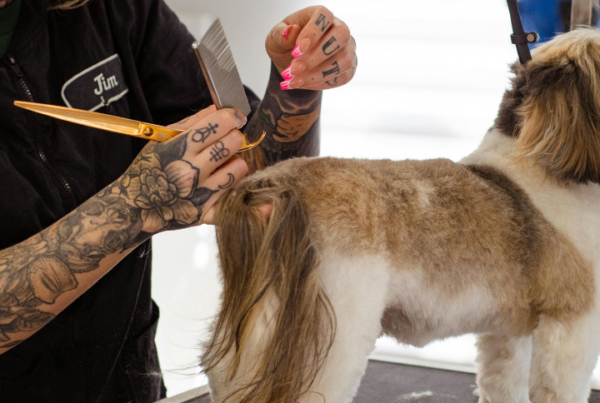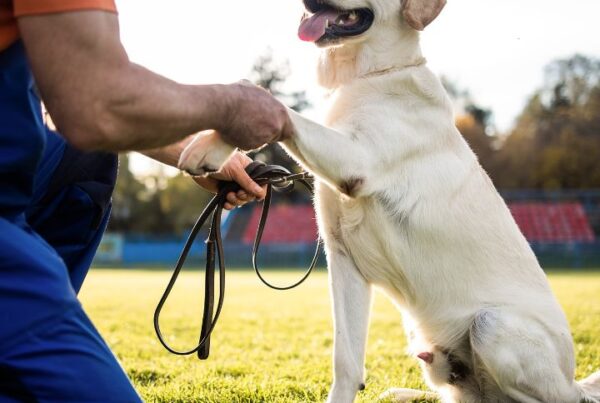When a groomed pup leaves your salon happy and healthy, it’s clear just how valuable your role as a professional groomer is! Along with groomers, veterinarians are another class of professionals that ensure animals are happy, healthy and well-cared for. So what is the difference between groomers and vets, and how do you know where your work ends and theirs begins?
It’s vital to understand what a veterinarian is responsible for versus what groomers do on a daily basis. Knowing this difference will allow you, the dog groomer, to perform your job efficiently and provide your grooming clients with advice on when to consult a vet.
Read on for our complete guide to distinguishing your role as a dog groomer!
What does a dog groomer do?
It goes without saying that dog groomers are animal lovers! Completing proper dog groomer training and getting the necessary skills and experience will set you up for success. Once you’re established, your daily duties can include cleaning a dog’s ears, clipping or trimming nails, brushing and bathing a dog’s coat, and using other techniques to ensure the dog is as clean and healthy as possible.

Dog groomers have a trained eye that can determine whether a dog has a skin condition, a flea allergy, or an infection, and can decide whether he should be groomed or not. Dog grooming courses provide practical hands-on training and first aid education to aspiring dog groomers which prepares you for dealing with different health issues.
As the groomer, it’s ultimately up to you which services you want to provide. Some groomers offer oral care maintenance, which includes using a dental spray and gel to break plaque and tartar. You can also include add-ons such as flea baths – it depends on your experience and which services you enjoy doing!
What does a veterinarian do?
The role of a veterinarian is similar to a dog groomer in that both professions care for the health of pets. However, a veterinarian is a trained medical professional who must have graduated from a 4-year program in veterinary medicine. Vets are highly knowledgeable in various sciences and must have a good deal of formal experience in order to practice in this field.
Pets, specifically dogs, are taken to veterinarians regularly for checkups that include a dental exam, discussing appetite, exercise, and breed-specific issues, as well as obtaining vaccinations and any necessary medications.
As the dog groomer, it’s important to be aware of how often your dog grooming client visits their veterinarian. You can get a sense of their overall health based on these visits.

Knowing the differences
Groomers operate out of salons that contain specific equipment such as hair dryers, nail clippers and dog-specific bathtubs, and the regularity of appointments is dependent on the type of dog. Some breeds should visit the groomer more than once a month, while others can go as long as 3 months in between grooming appointments.
Veterinarians, on the other hand, focus on the health of all animals with a focus on thorough medical assessments. They’ll take the dog’s temperature, listen to the heart and lungs, perform dental care, and keep the dog updated on vaccinations and prescriptions. Similar to a doctor for humans, it’s recommended that dogs visit their veterinarian for a check-up once a year during their adult lives, and more often if needed.
As a dog groomer, it is essential for you to be aware of the differences between your role and the role of your client’s veterinarian. While a general assessment of the dog’s health is necessary before a groom, this is not the same medical assessment that would be conducted by a veterinarian.
Your dog groomer training has prepared you for emergency situations within your salon, and you’ve learned best practices for de-matting and brushing, but there are limits on the services you can provide as a groomer.

Communicating differences to clients
You’ve gotten to know your dog grooming clients (both furry and human), and they’ve come to trust your expertise and judgment. Keeping the lines of communication open as a dog groomer is key, as you want your clients to understand both your role and the role of their veterinarian.
As you go about brushing, bathing, and trimming pets, it’s important to educate your clients on proper grooming tips that they can use in between appointments. It’s just as important to let them know the scope of your services as a groomer. For example, although you cannot provide full dental care to your clients, you can advise pet owners that a visit to their vet is needed for a full dental exam.
If you are conducting a physical assessment prior to grooming a dog and you find a potential infection that you are concerned about, referring your client to their vet is an excellent call to make.
Dog groomers and veterinarians may have very similar goals, but are two very different roles! Understanding the responsibilities and duties of each one will help you provide the best services you can to your grooming clients, and give their pet the best care possible!
A career as a professional dog groomer is extremely rewarding! Read on for 7 perks of the job and be inspired!



